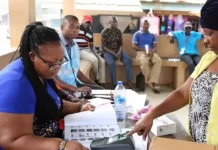
The recent microfinance crisis has shaken public confidence in the Bank of Ghana (BoG) as some Ghanaians are calling on the Governor to step down, stressing that, his continuous stay in office would mean more trouble for the country’s financial sector.
Under the leadership of Governor Dr. Henry Kofi Wampah, a number of financial institutions were accused of swindling depositors of their money through fraudulent schemes.
One particular microfinance company, DKM Diamond Microfinance Company, has squandered the about 77 million cedis of unsuspecting Ghanaians, making many depositors to lose their life savings and livelihoods.
Finance Minister, Seth Terkper last week told Ghanaian lawmakers that the company had invested the 77 million cedis of investors’ deposits into their personal businesses.
Interestingly, BoG says DKM Diamond had misled the central bank by filing inaccurate information about its operations even though they are expected to play a strong supervisory role as the regulator of the country’s banking sector including that of microfinance.
“DKM had been misreporting to the Bank of Ghana and had not been keeping accurate and reliable records of all transactions in its books, thereby violating section 53 and section 71 of Acts 673 as amended,” the central bank said last month.
When reached for comments, Dr. Kweku Johnson, a financial analyst with JP Morgan in US, told Business Day that: “Central Banks are expected to be a trusted institution. Maintaining confidence is one of its most important responsibilities and as soon as it loses it, that is all.”
Mr. Johnson, who is a Ghanaian continued: “The Governor should do the honorable thing and resign because he and his officials have messed up big time.”
Mrs. Georgina Adashie, a banker with a leading commercial bank in Accra questioned: “Why would BoG official sit down till something bad happens before the officials will move in to close down illegal microfinance institutions? What are they paid for?”
“It is just mere laziness. The Governor should not step down alone but other top officials of the bank must also do same to restore public confidence,” Adashie, who has 20 years’ experience in banking and finance told Business Day.
The comments from the aforementioned sources were not different from other ordinary Ghanaians that this paper spoke to.
Delivering the 2016 State of the Nation in Parliament last Thursday, President John Dramani Mahama has also blamed the microfinance crisis on poor supervision by the Bank of Ghana. He said the Central Bank which is the regulator of the microfinance sector failed to effectively supervise the activities of some of the companies.
“These microfinance companies come under the direct supervision of the Bank of Ghana. Unfortunately, lack of effective supervision on the part of the central bank has resulted in many cases in which microfinance licensed by the Bank have breached the rules of procedure they were supposed to follow and have created supposed pyramid schemes that eventually came crashing down,” he stated.
The President said even though the issue lies directly in the bosom of the Bank of Ghana, “government has a concern for the poor unsuspecting Ghanaian clients who deserved to be protected by a more robust inspection and supervisory regime by the Central Bank.”
He has therefore ordered the prosecution of directors of DKM Diamond Microfinance Company after its cars were seized by angry clients who had lost money due to the firm’s alleged fraudulent activities.
Meanwhile, the Bank of Ghana head of banking supervision, Raymond Amanfu, last week told The Africa Report recently that his outfit had deployed people across the country to improve its visibility.
“Yes, on supervision, we have increased the numbers, we have increased the mechanisms as well, we have sent people to the regions, so we have done something to strengthen supervision of these microfinance companies,” Amanfu said.
“The regulations are already there, but we have also made additional laws which are before parliament, and are waiting to be passed.”
When passed into law, the banking and specialised deposit institution bill – currently before a parliamentary committee for study – is expected to compel the central bank to fortify the licensing procedures and introduce consolidated supervision of financial institutions.
Officials say until the new law comes into being, Ghana’s central bank would lack the legal powers to close down any unauthorised financial institution except to report to the security agencies.
By John Kelly
























